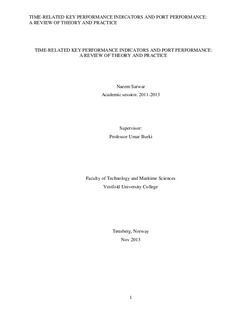Time-related key performance indicators and port performance : a review of theory and practice
Master thesis
Permanent lenke
http://hdl.handle.net/11250/2353184Utgivelsesdato
2013Metadata
Vis full innførselSamlinger
Sammendrag
The objectives of the thesis are to investigate the existing theoretical frameworks regarding as applied by ports‘ performance measurement and to find out the differences between theoretical approaches and practical use of time-related KPIs in ports. To answer the specific research question a case study of the Port of Melbourne is applied. The major findings of the study reveal the importance of time-related KPIs in port service quality measurement; integration of the indicators with other groups of KPIs depending on the current goals of the company; and variability of time-related KPIs depending on different groups of users of the information. Besides that, the study shows that in practice there is a limited number of time-related KPIs among the other performance indicators. Originality of this thesis is in its attempt to align the theoretical overview of time-related KPIs in port performance measurement with practical use of these indicators. Practical importance of this study is in its attempt to describe a case of a port‘s performance measurement, particularly in terms of its time efficiency. However, the study is limited by only one case study. Therefore, one of the directions for future research is a further extended analysis of various case studies, added by historical comparative analysis of port performance measurement systems, particularly in the part of their time efficiency
evaluation
